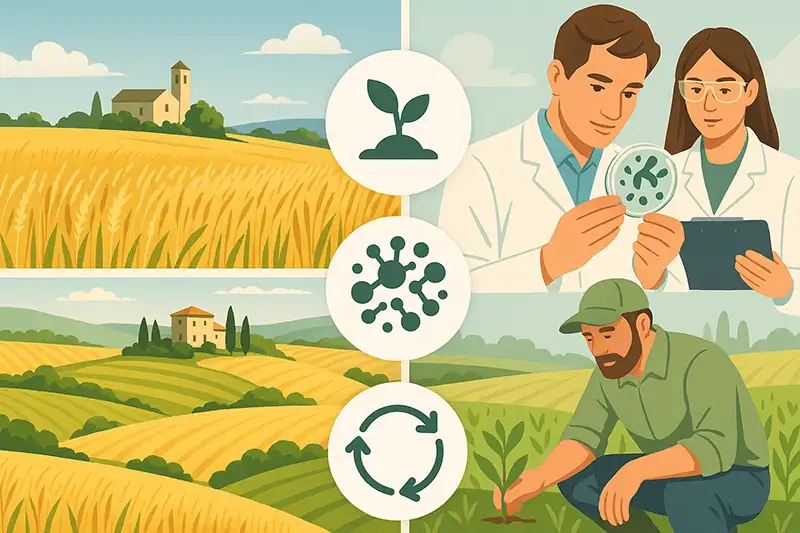The European project TRIBIOME is advancing steadily in its mission to revolutionise wheat cultivation through biological modulators that strengthen plants and enrich the soil. After more than two years of research and trials, the initiative is delivering its first field results, with AVA-ASAJA playing a central role in ensuring that laboratory innovations are tested and validated under real farming conditions.
AVA-ASAJA at the heart of field trials
Since 2023, TRIBIOME has established a network of experimental fields: four in Spain, four in Italy and additional sites in South Africa, where different biostimulants have been tested. By testing biomodulators in such diverse climates and soils, the project can evaluate their performance under contrasting conditions and ensure their scalability for agriculture across continents. Within this network, the Valencian Farmers’ Association (AVA-ASAJA) is responsible for coordinating and overseeing the European field trials, providing the essential bridge between scientific research and the practical realities faced by farmers.
By 2025, the first harvests have been completed across all European sites, providing valuable data that shed light on the benefits of the initial set of modulators applied. Throughout this first season, AVA-ASAJA has been coordinating systematic monitoring, using parameters such as NDVI, plant height, weed incidence and overall crop health. Results so far have revealed improvements in both colour and vigour, indicating that the modulators are enhancing plant performance. Root and soil samples have also been collected to characterise changes in the microbiome, with analyses now under way to assess their impact on soil quality and fertility.
From microorganisms to communities and extracts
The project’s second year has seen a step forward in the type of solutions under development. The first generation of modulators focused on individual microorganisms, but progress has now expanded to microbial communities and extracts derived from agricultural residues. These new formulations are currently being tested in pots, and the most promising candidates will be brought to the field in the next agricultural campaign.
This transition marks an evolution in TRIBIOME’s methodology, as it moves from isolated strains to more complex biological systems and circular solutions that also give value to waste materials. For AVA-ASAJA, this stage is especially relevant: as modulators evolve, the association ensures that they are evaluated in diverse field conditions, generating evidence that is directly applicable to farmers in Europe and beyond.
Preparing the next stage
While laboratory analyses continue, the next major milestone will be the selection of the most effective biomodulators and their validation under real conditions. These findings will be critical as TRIBIOME approaches its final phase, running until 2026, where the goal is to offer farmers practical and environmentally sound alternatives to conventional inputs that can help reduce dependence on fertilisers and pesticides, protect biodiversity and strengthen resilience against climate stress.
Funded under the Horizon Europe programme, TRIBIOME is coordinated by Spain’s Technological Institute of Packaging, Transport and Logistics (ITENE) and brings together more than a dozen international partners. Through its active role in steering and executing field trials, AVA-ASAJA is contributing not only to validating science but also to ensuring that innovative, sustainable solutions reach farmers. With TRIBIOME, agriculture is moving from laboratory breakthroughs to resilient crops rooted in healthier soils

